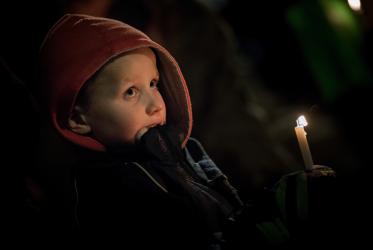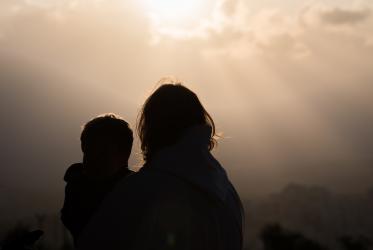by Kristine Greenaway
The faces of those who lead the global ecumenical movement have changed dramatically since 1954, says the head of the Christian Church (Disciples of Christ), Rev. Dr Sharon Watkins. Pictures of delegates to the World Council of Churches’ assembly held that year in Evanston, USA, show rows of men in dark suits and ties, most of them white.
“Stand and look at each other,” Watkins told a gathering of women who are in Trondheim, Norway, to participate in the WCC’s Central Committee meeting.
More than 80 women rose – women with faces from all parts of the world and of all ages, each woman dressed in the colours and styles of their home tradition.
“This is the WCC of 2016,” Watkins declared to applause. “We are strong and gifted women.”
Watkins is the chief executive officer of the Christian Church (Disciples of Christ) in the United States and serves as chair of WCC’s programme committee.
Among the women gathered for the six-day Central Committee meeting are bishops, doctors, academics, chartered accountants, church bureaucrats and young stewards serving the committee. A number are in senior positions in the global church organization. These include the WCC Presidents from Asia, Africa, Latin America and the Pacific and the Moderator of the Central Committee, Agnes Abuom, an Anglican laywoman and development consultant from Kenya. Abuom is the first woman and first African elected to the position.
The theme for the Central Committee meeting is “Pilgrimage: Discerning the Landscapes Together.” Part of changing church landscapes is the emergence of women in key leadership positions across member churches.
Dr Dimitra Koukouros of the Ecumenical Patriarchate of Constantinople told the gathering that, thanks to WCC programmes encouraging women’s participation in decision-making in the church, women had a bigger role than ever when Eastern Orthodox churches gathered in Crete recently for the Holy and Great Council of the Orthodox Church.
The fourteen-member Orthodox Churches of the Holy and Great Council were encouraged to include at least two women among their team of appointed advisors. Three churches responded, representing a breakthrough in the number of women present as advisors. Koukouros reports too that discussions at the Crete meeting reflected a new openness to, and awareness of, the problems of today’s world, including social justice issues and youth concerns.
Ms Berit Hagen Agøy of the Church of Norway sounded a note of caution amid the celebration.
“There are many young women who want to save the world and then they burn out when they are 25. The men become leaders when they are 40 or 50 after the women have done the work,” she told the group.
A female steward from Finland, Katarina Väisänen, agreed with Hagen Agøy and called for mentoring of young women by older women “so that they can stay the course.”
The gathering was organized as part of the WCC's work for a Just Community of Women and Men.
The Central Committee is the decision-making body responsible for policy and programme oversight of the World Council of Churches in the seven-year period between its general assemblies. Its meeting concludes tomorrow.
More information:
Just Community of Women and Men




![Image[1].jpeg](/sites/default/files/styles/teaser/public/photoshelterCopy/Image%5B1%5D.jpeg?h=44590859&itok=LMAXVRC6)

